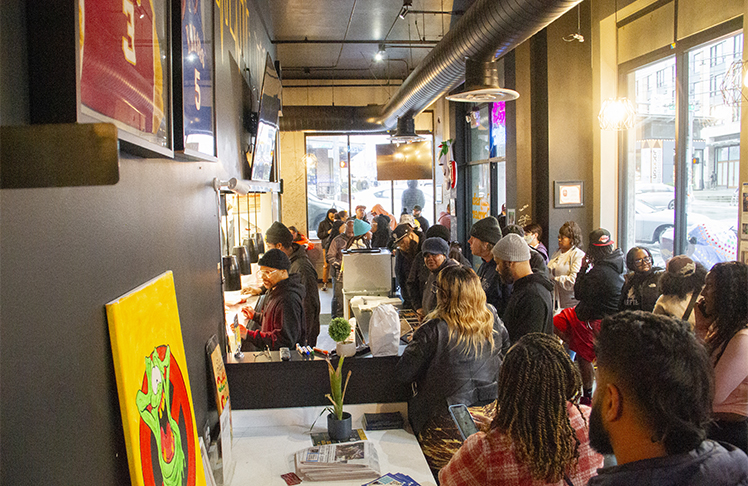
By Aaron Allen, The Seattle Medium
As the New Year begins, Seattle is witnessing the closure of several prominent Black-owned businesses. Among them is Catfish Corner, a Central District institution that has served southern-style catfish for 40 years. Other closures include Flowers Just 4 U, La Familia Sports Bar in Burien, Plum Bistro on Capitol Hill, and Nate Jackson’s Comedy Club in Tacoma. These closures highlight the mounting challenges faced by Black business owners, including the rising costs to do business like the increase in Seattle’s minimum wage to $20.67 per hour, which went into effect January 1, 2025.
Catfish Corner’s history dates back to the 1960s when Woodrow and Rosemary Jackson, part of a large migration of Black Americans to the West Coast, moved to Seattle from Texas and Louisiana. Woodrow worked at Bethlehem Steel but dreamed of bringing southern-style catfish to the area. With no such options locally, he began frying catfish in his backyard and, in 1985, opened Catfish Corner at the corner of Cherry Street and Martin Luther King Jr. Way.
“For about 25 years, my grandparents built this business from the ground up,” said Terrell Jackson, the grandson of the founders and current owner of Catfish Corner. “My grandfather worked at Bethlehem Steel while starting the restaurant, eventually quitting his job to focus on the business full-time.”
After Woodrow and Rosemary retired, the Jackson family faced the tough decision of whether to continue the business. Terrell chose to carry the legacy forward, reviving Catfish Corner in 2015. Starting with a tent and a deep fryer on a Skyway sidewalk, he spent years navigating various locations before establishing a thriving restaurant at 23rd and Jackson.
“From Skyway to Rainier Avenue, to New Hope Church, and finally to the Central District, I’ve seen this business grow through sheer determination and the community’s support,” said Jackson. “I wanted to show my grandparents that I could bring this business back and make it beautiful again.”
Despite his success, the journey was not without its challenges. Terrell began working in the family business at age 13 and witnessed the relentless effort required to sustain it. Ultimately, rising operational costs, including the impact of Seattle’s increasing minimum wage, and gentrification made continuing the business unsustainable.
“I put my all into it—blood, sweat, and tears,” Jackson said. “With the minimum wage at $20 an hour, it digs into our profit margins. I see many local businesses closing for the same reason. It’s time for me to step away. I’ve done my best, and I’m grateful to Seattle for supporting my family’s business for 40 years.”
“Everything was a learning experience. I can only get bigger from here,” continued Jackson. “I am Catfish corner so I could do this again anytime and anywhere. I started this on the sidewalk and ended in a million-dollar business. So, I appreciate everyone, their love and support.
For Jackson, the personal toll of running the business also factored into his decision.
“I want to spend more time with my children,” said Jackson. “Building this business was time-consuming, and I missed a lot of moments with them.”
Catfish Corner is not alone in closing its doors. Nate Jackson’s Comedy Club in Tacoma, one of the largest Black-owned comedy clubs in the country, has also shut down. Flowers Just 4 U, a Central District staple operated by Mary Wesley for decades, will close on January 15 as Wesley retires.
“You’ve got to have a financial cushion,” Wesley said, reflecting on the difficulties of running a small business. “Getting the right people in the right positions is also crucial because not everyone you hire will be who you need.”
Plum Bistro, a beloved vegan restaurant in Seattle, has also closed as of January 5. In a statement on its website, the restaurant shared, “The New Year seems an apt time to embark on new adventures… We’ll look back on these past 20 years with great gratitude for your patronage.”
These closures reflect the economic pressures disproportionately affecting Black-owned businesses. While minimum wage increases can improve wages for workers and reduce racial wage gaps, they also strain small businesses with limited resources. Combined with rising rents, inflation, and the high cost of living in Seattle, these factors have made it increasingly difficult for small businesses to remain viable.
Despite their closures, these Black business owners expressed profound gratitude for the community’s support.
“Seattle really gave me my flowers on my closing day. I appreciate everything,” said Terrell Jackson. “I appreciate the 40 years of community support for my family’s business in the Central District. I wouldn’t change anything in the world about it.”



